Ford Kuga VS Volvo XC40
In the latest showdown between the Ford Kuga and the Volvo XC40, the two SUVs present a compelling mix of style and practicality. While the Kuga offers a spacious interior and a range of efficient engines, the XC40 stands out with its premium finishes and superior safety features. Ultimately, the choice between these two versatile vehicles will depend on whether buyers prioritize functionality or luxury in their driving experience.
Ford Kuga
The Ford Kuga stands out in the realm of compact SUVs with its sleek design and dynamic performance capabilities. Its spacious interior is thoughtfully designed to provide comfort and practicality for both driver and passengers, making it an ideal choice for families and adventurers alike. Advanced technology and safety features further enhance the driving experience, ensuring a seamless blend of innovation and reliability on the road.
detailsVolvo XC40
The Volvo XC40 is a standout model in the compact SUV segment, offering a delightful blend of Scandinavian design and practicality. Its interior is both stylish and functional, featuring premium materials and innovative storage solutions that make every journey comfortable. The car's performance is smooth and responsive, with advanced safety features ensuring peace of mind for drivers and passengers alike.
detailsThe automotive landscape is ever-evolving, with brands racing to showcase the latest technology, performance, and sustainability options. In this segment, we pit two formidable contenders against each other: the Ford Kuga and the Volvo XC40. Both vehicles embody the compact SUV trend that appeals to diverse customer bases, from city dwellers to outdoor enthusiasts. Let's delve into a detailed comparison of their technical aspects and innovations.
Engine Options and Performance
The Ford Kuga boasts a versatile lineup of powertrains, including petrol, full hybrid, and plug-in hybrid options, catering to a range of preferences. With horsepower outputs ranging from 150 to an exhilarating 243 HP, the Kuga offers significant performance flexibility. The Kuga's engine options also promise impressive efficiency, with fuel consumption as low as 5.3 L/100km and an electric range of up to 69 km for those who opt for the plug-in hybrid model.
On the other hand, the Volvo XC40 focuses on modern petrol mild-hybrid engines, producing between 163 and 197 HP. Although the XC40 slightly lags in acceleration compared to the Kuga, its performance is still noteworthy, achieving 0-100 km/h times of 8.6 s and 7.6 s respectively. The XC40's automatic dual-clutch transmission provides smooth shifting, enhancing the driving experience.
Fuel Efficiency and Emissions
With growing concerns about the environment, fuel efficiency and CO2 emissions play pivotal roles in consumer decisions. The Ford Kuga excels in this regard, particularly with its hybrid variants showing CO2 emissions as low as 20 g/km, while its traditional petrol engines manage figures around 122-145 g/km. The Kuga's hybrid options are particularly suited for eco-conscious buyers who do not want to compromise on performance.
Conversely, the Volvo XC40, with emissions pegged at 147-148 g/km, is slightly less efficient but still competes well within its class. Its mild-hybrid technology bridges the gap between performance and sustainability, but it's clear that Ford's comprehensive approach to hybrid and electric offerings gives the Kuga an edge in the battle for eco-friendly credentials.
Interior Comfort and Space
Inside, both SUVs offer modern and functional interiors designed for comfort and convenience. The Ford Kuga provides ample trunk space of 412 L, which is slightly less than the XC40's capacity of 452 L. Both vehicles feature five seats and prioritize passenger comfort, but the XC40 leans towards a more minimalist Scandinavian aesthetic, while the Kuga strikes a balance between style and practicality.
Technologically, the Kuga incorporates the latest Ford SYNC infotainment system, providing seamless integration of smartphones and advanced navigation features. The XC40, however, emphasizes a luxurious experience with Volvo's acclaimed infotainment system and high-quality materials, elevating the overall feel of the cabin.
Safety Innovations
Safety is paramount in both models. The Kuga features Ford Co-Pilot360, an advanced suite of safety technologies including adaptive cruise control and lane-keeping assistance. These features work together to enhance driver awareness and prevent accidents, a critical focus for the brand.
Volvo, known for its unwavering commitment to safety, equips the XC40 with a plethora of advanced safety features, including City Safety Collision Avoidance Technology and Pilot Assist, which combines adaptive cruise control with lane-keeping assistance. Volvo’s reputation for safety is well-deserved, making the XC40 a reliable choice for families.
Conclusion: Which SUV Reigns Supreme?
In the Ford Kuga versus Volvo XC40 showdown, each vehicle brings unique strengths to the table. The Kuga shines with its variety of powertrain options, superior fuel efficiency in hybrid models, and practical interior space. Meanwhile, the XC40 leans into luxury, solid safety innovations, and a robust mild-hybrid system.
Ultimately, the choice comes down to personal preferences. If versatility and a robust hybrid option are paramount, the Ford Kuga is likely the better fit. On the other hand, if a luxury feel combined with cutting-edge safety features is your top priority, the Volvo XC40 makes a compelling argument. Whichever you choose, both SUVs represent the best of what the compact segment has to offer in 2024.
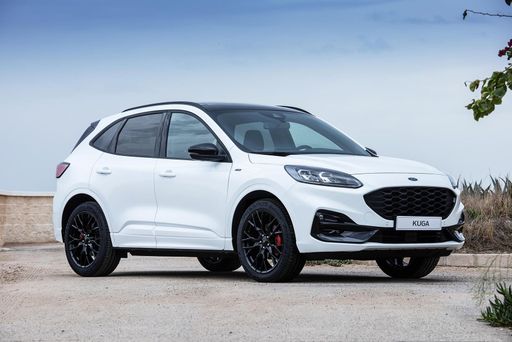 @ kuga.fordpresskits.com
@ kuga.fordpresskits.com
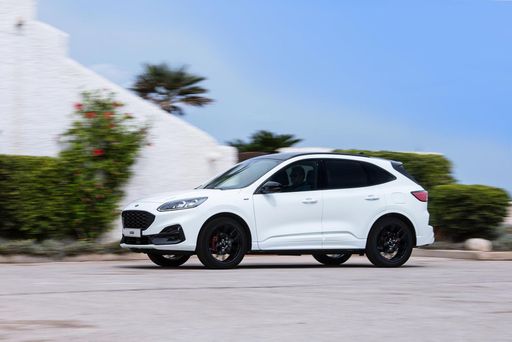 @ kuga.fordpresskits.com
@ kuga.fordpresskits.com
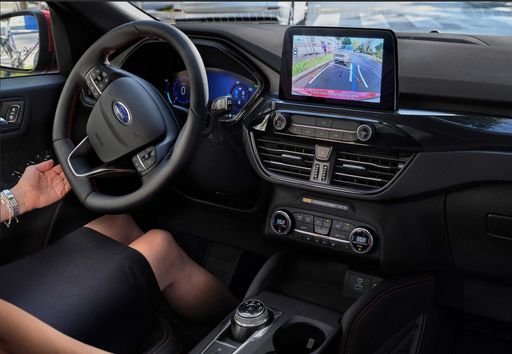 @ kuga.fordpresskits.com
@ kuga.fordpresskits.com
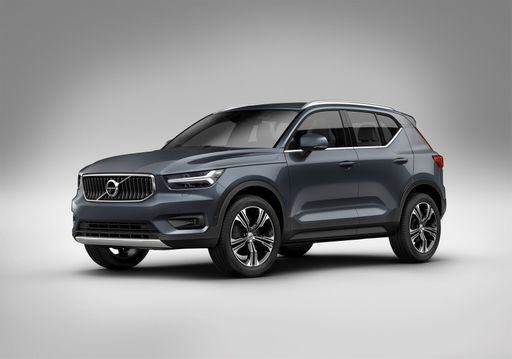 @ media.volvocars.com
@ media.volvocars.com
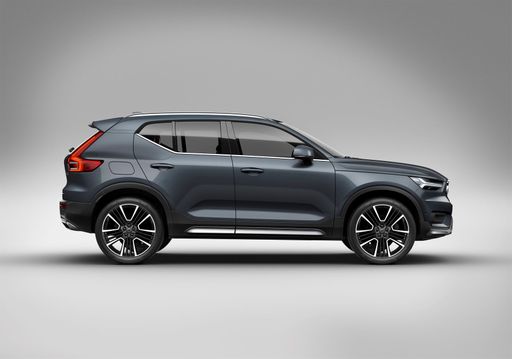 @ media.volvocars.com
@ media.volvocars.com
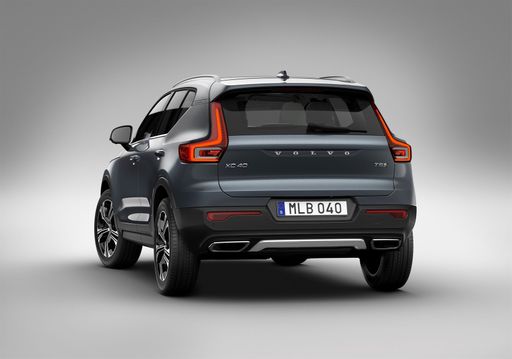 @ media.volvocars.com
@ media.volvocars.com
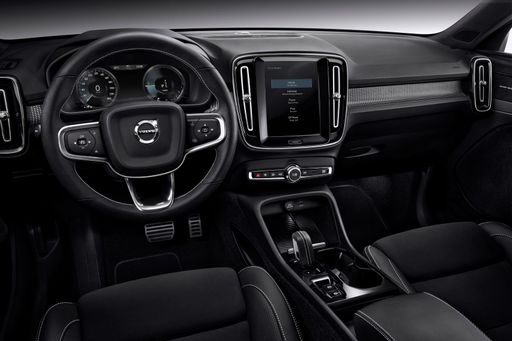 @ media.volvocars.com
@ media.volvocars.com
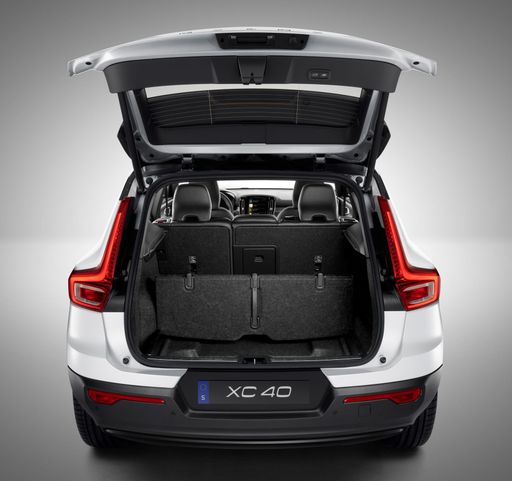 @ media.volvocars.com
@ media.volvocars.com

|

|
|
|
|
Costs and Consumption |
|
|---|---|
|
Price
about 36900 - 48600
$
|
Price
about 39300 - 49600
$
|
|
Consumption L/100km
0.9 - 6.4
L
|
Consumption L/100km
6.5
L
|
|
Consumption kWh/100km
-
|
Consumption kWh/100km
-
|
|
Electric Range
69
km
|
Electric Range
-
|
|
Battery Capacity
1.1 - 14.4
kWh
|
Battery Capacity
-
|
|
co2
20 - 145
g/km
|
co2
147 - 148
g/km
|
|
Fuel tank capacity
42 - 54
L
|
Fuel tank capacity
54
L
|
Dimensions and Body |
|
|
Body Type
SUV
|
Body Type
SUV
|
|
Seats
5
|
Seats
5
|
|
Doors
5
|
Doors
5
|
|
Curb weight
1526 - 1859
kg
|
Curb weight
1688
kg
|
|
Trunk capacity
412
L
|
Trunk capacity
452
L
|
|
Length
4604 - 4645
mm
|
Length
4425
mm
|
|
Width
1882
mm
|
Width
1863
mm
|
|
Height
1673 - 1681
mm
|
Height
1652
mm
|
|
Payload
541 - 550
kg
|
Payload
532
kg
|
Engine and Performance |
|
|
Engine Type
Petrol, Full Hybrid, Plugin Hybrid
|
Engine Type
Petrol MHEV
|
|
Transmission
Manuel, Automatic
|
Transmission
Automatic
|
|
Transmission Detail
Manual Gearbox, CVT
|
Transmission Detail
Automat. Schaltgetriebe (Doppelkupplung)
|
|
Drive Type
Front-Wheel Drive, All-Wheel Drive
|
Drive Type
Front-Wheel Drive
|
|
Power HP
150 - 243
HP
|
Power HP
163 - 197
HP
|
|
Acceleration 0-100km/h
7.3 - 9.5
s
|
Acceleration 0-100km/h
7.6 - 8.6
s
|
|
Max Speed
195 - 200
km/h
|
Max Speed
180
km/h
|
|
Torque
240
Nm
|
Torque
265 - 300
Nm
|
|
Number of Cylinders
3 - 4
|
Number of Cylinders
4
|
|
Power kW
110 - 178
kW
|
Power kW
120 - 145
kW
|
|
Engine capacity
1497 - 2488
cm3
|
Engine capacity
1969
cm3
|
|
Top speed
195 - 200
km/h
|
Top speed
180
km/h
|
General |
|
|
Model Year
2024
|
Model Year
2024
|
|
CO2 Efficiency Class
E, D, B
|
CO2 Efficiency Class
E
|
|
Brand
Ford
|
Brand
Volvo
|
Ford Kuga
Discovering the Ford Kuga: An SUV for the Modern Age
The Ford Kuga has established itself as a versatile and reliable choice in the competitive SUV market. Combining sleek design with innovative technology, the Kuga offers a range of options to suit different driving preferences and needs. Let’s delve into the various technical details and pioneering features that make this vehicle stand out.
Design and Construction
The Ford Kuga embodies a contemporary design ethos, with dimensions that accommodate both functionality and style. Measuring between 4604 and 4645 mm in length, the Kuga is designed to offer ample interior space while maintaining a compact exterior profile. This is complemented by a width of 1882 to 1883 mm and a height ranging from 1650 to 1681 mm, ensuring a comfortable and commanding drive on the road.
Innovative Powertrains
With a diverse array of engine configurations, the Kuga caters to both traditional and eco-conscious drivers. The range includes 1.5-litre EcoBoost petrol engines, 2.0-litre EcoBlue diesel options, as well as an innovative 2.5-litre full hybrid and plug-in hybrid variants. The hybrid models, particularly the plug-in hybrid, offer impressive efficiency with a consumption as low as 0.9 L/100 km and an electric range of up to 69 km.
Performance and Efficiency
The Kuga delivers a robust performance with power outputs ranging from 120 PS to 243 PS, ensuring there is a model to match your driving style. The vehicle accelerates from 0-100 km/h in as little as 7.3 seconds, depending on the chosen powertrain. Notably, the plug-in hybrid versions allow for considerable fuel savings, making the Kuga a cost-effective option for long-term use.
Advanced Technology and Features
Ford has integrated the latest technology into the Kuga, enhancing both comfort and safety. The vehicle features multiple driving modes tailored to different terrains, advanced driver-assistance systems, and a user-friendly infotainment system that keeps all controls within easy reach. The intelligent all-wheel-drive system available on certain models provides enhanced grip and stability in challenging conditions.
Interior Comfort and Practicality
Inside the Kuga, you'll find a spacious cabin with seating for five, designed with both comfort and utility in mind. The boot space ranges from 405 to 435 litres, allowing for an impressive amount of luggage capacity. High-quality materials and smart design choices throughout the cabin ensure a premium experience, further enhanced by options like Vignale trims for those seeking added luxury.
A Sustainable Choice
With its focus on efficiency and reduced emissions, the Ford Kuga aligns with the growing demand for environmentally responsible vehicles. The CO2 emissions range from 20 to 155 g/km, placing many models in favourable efficiency classes, thus contributing to a more sustainable future.
Conclusion
The Ford Kuga stands out in the SUV segment by offering a perfect blend of performance, technology, and sustainability. Its versatility makes it an ideal choice for diverse lifestyles, from urban adventures to rural explorations. With its innovative features and design, the Kuga is a testament to Ford’s commitment to delivering high-quality vehicles suited to today's discerning drivers.
Volvo XC40
Introduction: The Refined Volvo XC40
The Volvo XC40 is a testament to Swedish innovation and design, blending practicality with cutting-edge technology in the compact SUV segment. Aimed at drivers who value safety, comfort, and eco-conscious driving, the XC40 continues to uphold Volvo's reputation for engineering excellence. In this article, we'll explore the technical specifications and innovative features that make the XC40 a standout choice for modern drivers.
Power and Performance
Under the bonnet, the Volvo XC40 offers a range of mild-hybrid petrol engines, combining efficiency with a responsive driving experience. The power output ranges from 163 to 197 PS (120 to 145 kW), ensuring robust performance for both urban commuting and longer journeys. With a maximum torque of 265 to 300 Nm, the vehicle offers smooth acceleration, achieving 0-100 km/h in just 7.6 to 8.6 seconds, whilst maintaining a CO2 efficiency class of E.
Efficiency Meets Eco-Conscious Design
The mild-hybrid system in the XC40 effectively reduces fuel consumption, with an impressive average of 6.5 L/100km. The system recycles braking energy to charge the battery, reducing emissions to between 147-148 g/km without compromising on performance. This design aligns perfectly with Volvo's commitment to sustainable motoring.
Cutting-Edge Transmission
The XC40 is equipped with an advanced automatic dual-clutch transmission that seamlessly transitions through gears, enhancing both fuel efficiency and driving comfort. The integration of this technology underscores Volvo’s commitment to delivering an engaging yet smooth driving experience.
Sophisticated Interior Design
The interior of the XC40 reflects Volvo’s dedication to Scandinavian design aesthetics, featuring a spacious cabin with high-quality materials. The vehicle comfortably seats five passengers, with a versatile boot space of 452 litres, making it ideal for family outings or road trips. The intuitive infotainment system is seamlessly integrated, providing driver-friendly access to navigation, entertainment, and safety features.
Safety Innovations
Volvo’s renowned safety reputation is evident in the XC40’s comprehensive suite of safety features. Advanced driver assistance systems, including adaptive cruise control, blind-spot monitoring, and lane-keeping aid, ensure a secure driving environment. The XC40’s construction and technology adhere to Volvo's “Vision 2020” strategy, aiming for zero fatalities or serious injuries in new Volvo cars.
Conclusion: A Contemporary Choice
The Volvo XC40 stands out as a compact SUV that blends innovation, efficiency, and style. Its proactive approach to hybrid technology, coupled with Volvo’s trademark focus on safety and design, makes it a compelling choice for those seeking a blend of practicality and performance. Whether it’s the daily commute or a weekend getaway, the XC40 is engineered to deliver a dynamic and sustainable driving experience.
